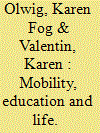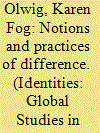|
|
|
Sort Order |
|
|
|
Items / Page
|
|
|
|
|
|
|
| Srl | Item |
| 1 |
ID:
137922


|
|
|
|
|
| Summary/Abstract |
Youths from the Global South migrating for further education often face various forms of discrimination. This Caribbean case study discusses how conditions in the home country can provide a foundation for educational migration that helps the migrants overcome such obstacles and even develop a strong sense of agency and self-empowerment. In the post-WWII period, numerous Caribbean women trained in nursing at British hospitals that have been described as marred by race and gender related inequality and associated forms of exploitation. Yet, the nurses interviewed about this training emphasised its high quality and downplayed the problems encountered. This positive attitude, it is argued, must be understood in the light of the key ideological role of education, particularly for a profession, as an avenue of social and personal mobility in the late-colonial Caribbean societies and the ways in which it enabled these Caribbean women to stake out a new life for themselves.
|
|
|
|
|
|
|
|
|
|
|
|
|
|
|
|
| 2 |
ID:
137921


|
|
|
|
|
| Summary/Abstract |
Travel for educational purposes, once the privilege of the upper class, has become a global mass phenomenon in recent years. This special issue examines, within different cultural and historical contexts, the close relationship between migration, education and social mobility. Adopting the perspective that education includes a broad range of formative experiences, the articles explore different educational trajectories and the local, regional and transnational relations in which they are embedded. Three key issues emerge from the analyses: firstly, the central role of temporality in terms of both the overall historical conditions and the specific biographical circumstances shaping educational opportunities; secondly, the complex agendas informing individuals’ migration and the adjustment of these agendas in the light of the vagaries of migrant life; and thirdly, the importance of migrants’ self-perception as ‘educated persons’ and the invention of new, and the maintaining of old, identities that this involves.
|
|
|
|
|
|
|
|
|
|
|
|
|
|
|
|
| 3 |
ID:
123193


|
|
|
|
|
| Publication |
2013.
|
| Summary/Abstract |
The notion of diversity, which has gained increasing prominence in recent years, promises to rejuvenate migration research in terms of the theoretical and methodological lines of enquiry pursued, the empirical data generated and the interpretations and knowledge produced. By pointing to the existence of many possible forms of differentiation and belonging in social life, it offers a productive alternative to the ethnic framing that has characterised much migration research, whether large-scale quantitative surveys or small-scale ethnographic community studies. It, furthermore, can bring into sharper focus the significance of the temporal and spatial aspects of migration and related processes of inclusion and exclusion. Finally, it can stimulate the development of new, innovative research methods. There is still a need, however, to explore the complex nature of diversity as an empirical phenomenon and analytical concept. This is discussed with particular reference to mobility, contexts of sociality and the politics of academic concepts.
|
|
|
|
|
|
|
|
|
|
|
|
|
|
|
|
|
|
|
|
|